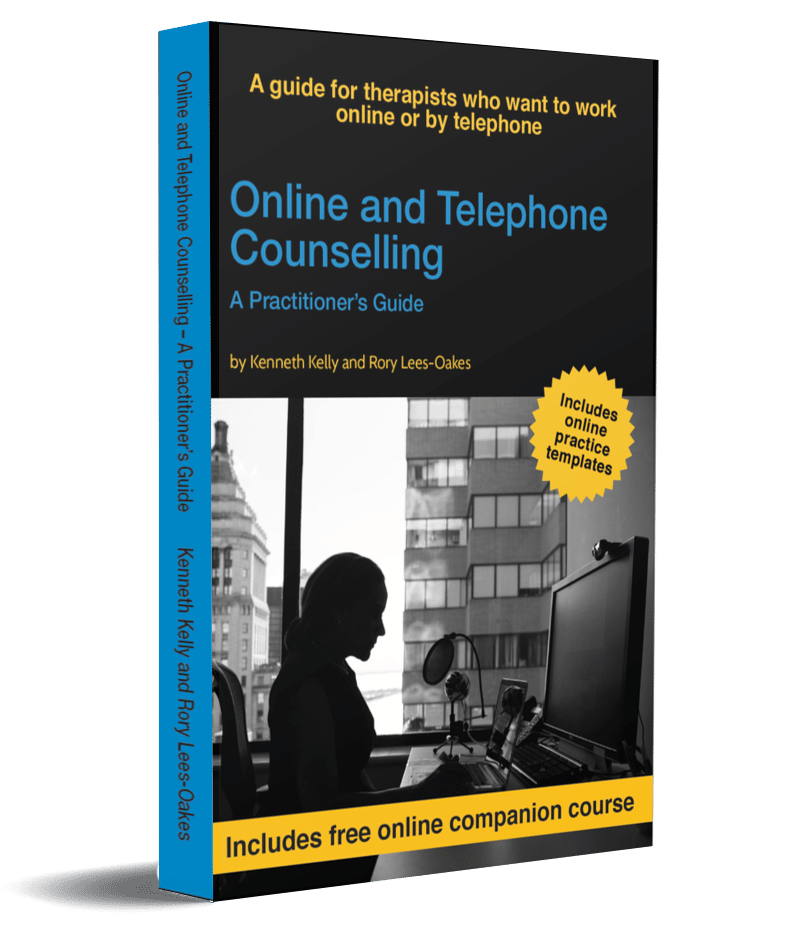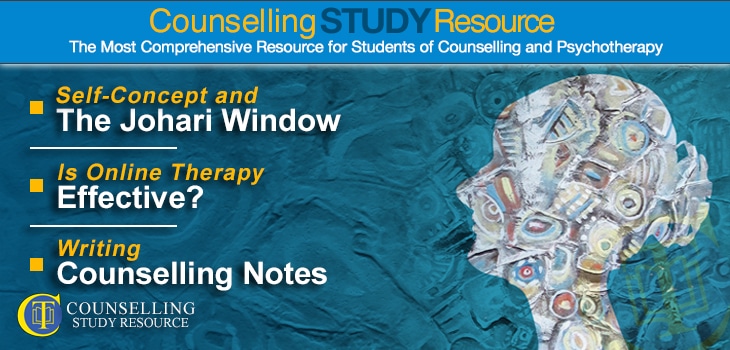166 – Is Online Therapy Effective?
Self-Concept and the Johari Window – Writing Counselling Notes
In episode 166 of the Counselling Tutor Podcast, Ken Kelly and Rory Lees-Oakes kick off with the Student Check-in, talking about self-concept and how the Johari window can be used to promote personal development.
‘The Digital Counselling Revolution’ then focuses on the question ‘Is online therapy effective’ and the research evidence for its effectiveness.
Then, in ‘Practice Matters’, the presenters provide tips on writing counselling notes.
Self-Concept and the Johari Window (starts at 1.20 mins)
We choose topics for this section from emails that we receive or from posts on our Facebook page. In the Counselling Tutor Facebook group, you can connect with over 33,000 students, tutors, qualified counsellors and supervisors.
It’s a great opportunity to ask any questions and discuss your learning, getting other people’s ideas and input into your learning.
Questions about self-concept crop up quite regularly there. In this podcast, Rory and Ken explore what self-concept is, focusing on the Johari window as a tool that can really help in identifying your self-concept and working towards living fully as your real self.
Named after its creators, Joseph Luft and Harry Ingham, the Johari window comprises four ‘panes’, corresponding to aspects that are:
- known to self and known to others
- not known to self but known to others
- known to self but not known to others
- known neither to self nor to others.
Ken and Rory look at how each of these four areas fits with counselling training and practice, pointing out that the model is relevant to qualified practitioners as well as to new students of counselling and psychotherapy.
As we continue to grow in self-awareness, we gradually reveal more and more of the unknown areas, enabling us to move forward further and further in our personal development.
A new lecture on self-concept– by counsellor and trainer Emma Chapman – has recently been added to the Counselling Study Resource (CSR). In addition, Rory has created a handout on the Johari window, which you can download here or access through the CSR.
Is Online Therapy Effective? (starts at 14.50 mins)

BESTSELLER
Online & Telephone Counselling Book
Available in Paperback and Kindle
Includes FREE COMPANION COURSE that you can do online to underpin and strengthen your learning
It might seem that online therapy is a very new phenomenon, but in fact research has been going on into this for some time.
For example, in 2017, Aisling Treanor – in her doctoral thesis – researched the extent to which relational depth can be reached online. Ken describes his own story of just how effective online therapy can be, of how effective it can be to build a relationship remotely.
Treanor reviews various research studies, including a meta-analysis of the effectiveness of internet-based psychotherapeutic interventions by Barak et al. in 2008.
She notes that internet-based interventions were found to be more effective in treating psychological problems (such as PTSD, panic and anxiety) than in treating physiological or somatic disorders (2017: 16).
She also observes that young people (aged 19 to 24) and mid-range adults (aged 25 to 39) seem to gain more from internet-based therapy than those aged 18 or younger and than older (40-plus) adults (2017:16). Ken and Rory talk about possible reasons for this.
So is online therapy effective? It seems that relational depth can be experienced by some individuals online, while others are unable to reach that level of depth with their therapist, despite experiencing it face-to-face.
This seems likely to lead to a ‘mixed economy’ where some clients may enjoy working online and find a real connection with their therapist, while others may really struggle with it and so may prefer face-to-face sessions.
This topic is explored in a blog post by Mick Cooper, entitled ‘Relational Depth in Online Therapy: Can it be experienced, and what facilitates and inhibits it?’
Writing Counselling Notes (starts at 25.30 mins)
Should therapists write notes during or after sessions? Rory explains that he generally would not write notes during sessions, instead doing so from memory after the client has left.
However, he might ask whether the client minded him taking notes during the session if there was some particularly complex information being provided, or a safeguarding issue had cropped up.
There is a difference between clinical notes, which should be factual, and process notes, which person-centred therapists may make for their personal use or to take to supervision; these may be more based on the therapist’s opinions and feelings.
Different modalities may use different types of notes and note-taking practices; for example, CBT generally involves more use of paperwork during sessions.
Do ensure too that – if you practise with an agency or counselling employer – that you follow the organisation’s policy on note-taking.
Counsellor CPD is an online library of on-demand lectures for qualified practitioners of counselling and psychotherapy.
Free Handout Download
Johari Window
